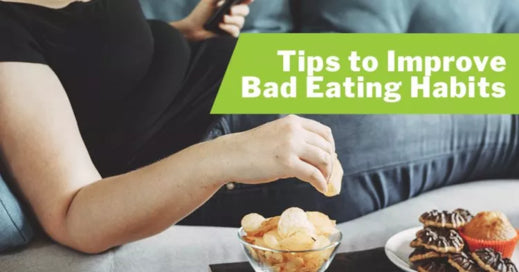Your Cart is Empty

Tips to Improve Bad Eating Habits
Avoid Limiting Factors
Eating Too Fast
The faster you do something, the more likely you are to make mistakes. And the same is true for your eating speed. Slow it down. Whether you are rushing between activities or trying to multitask, eating too isn’t helpful to your health goals. It can cause an upset stomach, your body won’t be able to accurately register when you are full, and you may eat more calories than intended.
Set aside time for meals and focus on what you are eating:
- Pause between bites – take a deep breath, set down utensils, take a sip of water
- Savor each bite – focus on the smells, flavors, and texture as though tasting fine wine
- Pace yourself – set a meal timer or pace yourself with the slowest eater at the table
Mindless Eating
This is similar to eating to fast. Whether you’re eating meals while you drive, watch TV, or work, you’re not truly focused on what you’re eating. You’ll miss hunger and fullness cues, eat more calories than intended, and potentially put yourself in danger as a distracted driver. Ask your client to set aside time for meals. Even if it’s just one meal a day, it’s a great way to start building healthier eating habits.
Not Recognizing Hunger Cues
While many of us may miss these cues because we’re distracted or don’t have time to answer them, some simply don’t understand what their body is trying to tell them. As much as we wish it were true, noon is not actually the cue for eating lunch.
Social norms have taken over biological hunger cues:
- Time of day
- Emotions
- Events
- Advertising
- Diet rules
Recognize what your body is telling you rather than society:
- Growling stomach
- Sense of abdominal emptiness
- Lightheadedness
A food diary can help you become more aware of what triggers you to eat. You will not only track foods and portion sizes, but also how you feel before eating and afterward. Mindful eating is the first step to building better habits.
Irregular Habits
Occasionally skipping breakfast, ditching your meal plan for fast food, or only making time for a healthy dinner once in a while doesn't support a balanced diet. Irregular habits can be just as detrimental as bad habits.
A planned cheat meal or an occasional ice cream is fine. You’re not going to undo everything with one deviation. But if you’re doing that several times a week or only following your meal plan when you feel like it, that’s what affects long-term goals. Be consistent with your healthy habits to stay on track and hit your goals faster!
Emotional Eating
Using food to manage your feelings is an unhealthy way to deal with feelings and food. Potential problems include:
- Feeling out of control
- Losing touch with other ways to manage feelings or feel comfort
- Unable or unwilling to stop when satisfied
- Feeling compelled to do it
Some alternatives to eating:
- Yoga
- Meditation/relaxation techniques
- Taking a walk
- Journaling
- Talking with a therapist or friend
No Cooking Skills
You might not want to admit it, but what If you don’t know how to cook? Or how to shop for and pick out healthy food? I understand the struggle of my clients, when you are used to eat fast food and frozen dinners, it will be tough to stick to a healthy eating plan.
So, start with the basics:
- How to make a healthy kitchen – Review some of the essential cookware they might need and food choices they should include on their grocery list—vegetables, whole-grain foods, etc. Maybe even take them on a field trip to the grocery store they can see first-hand where to find the good food and which aisles they should avoid. A
- Tips for meal prep success – Meal prep can make healthy eating a breeze, especially if they’re just starting out. Review some of the foods that store well and supply good nutrients and share some of your favorite recipes.
- Healthy eating on the go – Life isn’t perfect, so reassure your clients that is can still be okay to eat out now and then, even if it’s a quick meal on the go. Teach them what to looks for on a menu and substitutes they can ask for to help them stick to their goals.
Getting started is always the hardest part, especially if you’re breaking down bad habits. And this is true for healthy eating and physical activity, which is why I have developed my 28 page Approved Food List that come free with all plans offered on my online program. The current Summer Body Beatdown is a great way to get started managing your food habits. The program comes with plenty of food options, recipes, and meal plans and useful information to assist you with your goals.
How did you feel about this article? Did I leave anything out? Any questions please let me know!!
Ryan